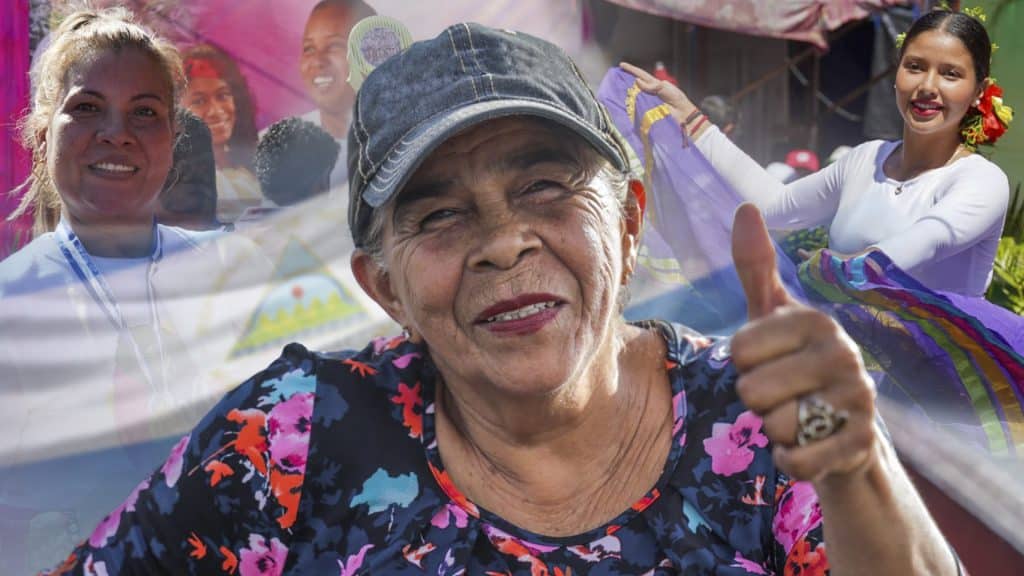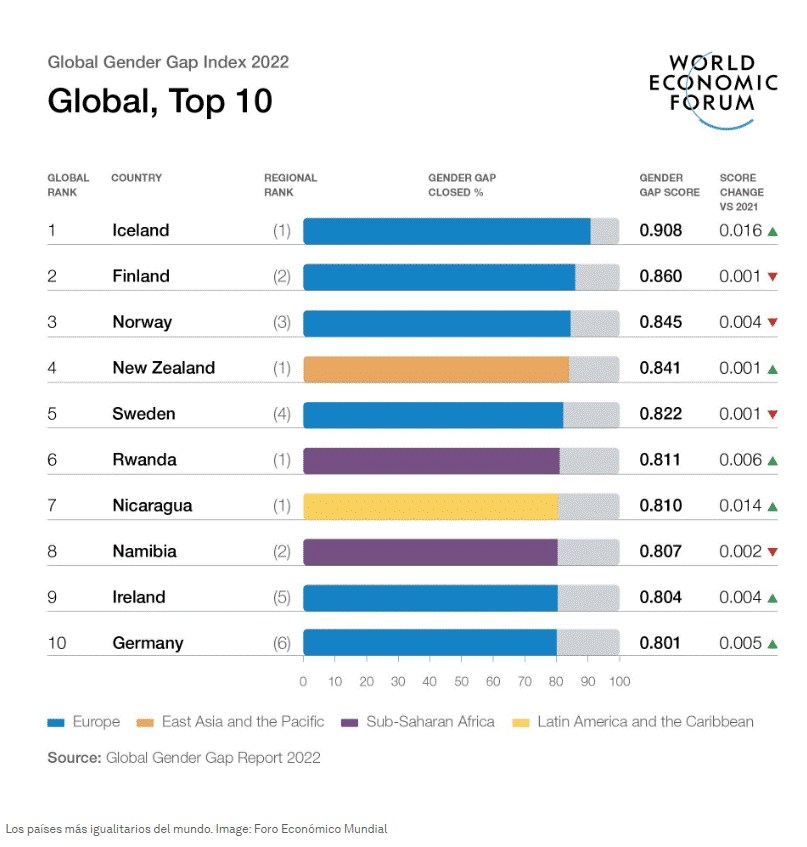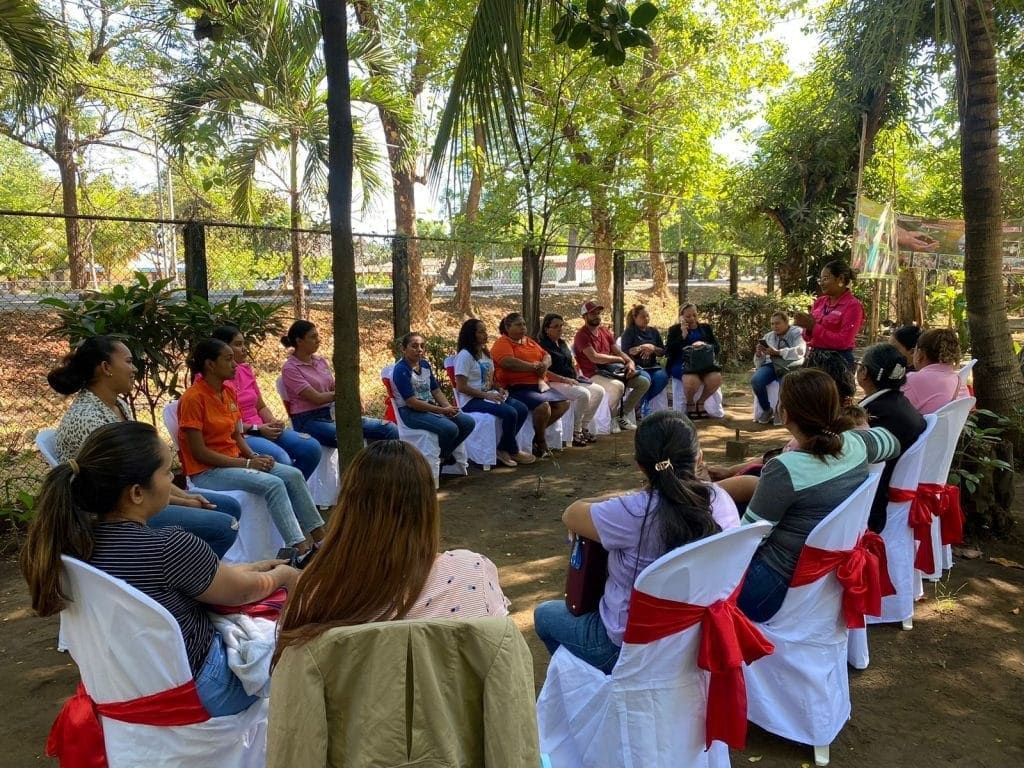
There is a place within this world, where women govern, decide, and have the opportunity to succeed, following the course of their dreams. This world is physically small, but immense in the implementation of gender policies, and this is Nicaragua. How has this nation, located at the waist of America, managed to position itself in one of the coveted first places worldwide, in the Global Gender Gap Report of the Economic Forum (WEF)?
According to the latest report on the WEF’s Global Gender Gap 2022, at the international level it would take 132 years to achieve gender parity, taking into account that only 68% of the gap has been closed. Despite this, Nicaragua is positioned in the seventh place in the general ranking; but it ranks 1st in the Educational Achievement sub-index; and 5th place in the Political Empowerment sub-index, with continuous high parity in ministerial and parliamentary positions.

Women Lead Public Offices in Nicaragua
On February 9, 2023, the president Daniel Ortega, presided over an official act in Managua, where he highlighted the Vice President of Nicaragua, Rosario Murillo, as Co-President of the Republic. The president highlighted the outstanding role of the deputy president, leading a number of important actions at the service of that nation.
With the Sandinista government, women have projected themselves as active agents of change. And precisely for this reason, it is not free that the WEF emphasizes the growth of professional and technical roles, as well as for legislators, officials and senior managers, adding the strength of the workforce in different socioeconomic areas.
In 2022, Nicaragua marks a historic and transcendental milestone in democracy. For the first time, in the Municipal Elections, it is guaranteed that more than 50% of women are candidates for public office, and that a majority of mayors and councilors are elected, thus becoming another benchmark for equality and gender alternation in the region.
Guaranteed alternation and gender equity
Likewise, the leading role of women was also established in a transversal role, occupying the responsibility of 50% plus one in the functions and structures of the Supreme Electoral Council, in the 2022 Municipal Elections, including the number of members of the Receiving Boards of Votes.
Added to this, the Nicaraguan National Assembly stands out for having the third place worldwide, among the countries with the largest number of parliamentarian women.
Similarly, UN Women highlighted that Nicaragua in 1st place among the top countries, worldwide, where women hold a minimum of 50% of ministerial positions: Nicaragua (58.82%), Austria (57.14%), %), Sweden (57.14%), Belgium (57.14%), Albania (56.25%), Rwanda (54.84%), Costa Rica (52.00%), Canada (51.43%) and Andorra, Spain, Finland, France and Guinea-Bissau (50%).

Nicaragua, safe territory for women
Recently, some 24 delegates from the Alliance for Global Justice were in Nicaragua, investigating the living conditions of community women, peasants, feminists, self-employed workers, state officials and leaders. The final report of the international organization highlights that this country «has the lowest crime rate in Central America, and it is a safe and welcoming country that gives priority to human rights and the needs of the population.»
«We were inspired by the empowerment and leading role of Nicaraguans, and, in particular, of women and their participation in their communities and the different instances of the State,» summarizes the report, which in turn, attests to «Nicaragua’s significant investments in infrastructures that have significantly improved the lives of people and women, including: “hospitals with the latest technology and innovative programs for women’s health care; electricity in all homes and free education at all levels”.
Free, comprehensive and timely health for women
The Government of President Daniel Ortega and Vice President Rosario Murillo, in March 2023, promotes a broad day of celebration in Nicaragua «to honor the historical courage of women», with the delivery of homes, streets, electricity, property titles, fair and solidarity credit programs; as well as an important women’s health care campaign.
You can read: Nicaragua enters the prestigious ASTA World Destination Guide
The vice president of the Central American country, Rosario Murillo, recently celebrated the figures on health issues: the country has been managed from 2006 to date to reduce maternal mortality by 68%; In addition, through the Special Maternity Homes Program, 72,000 women were sheltered in 2022, who underwent assisted deliveries. In total, through the extensive Hospital Network, 17 million care attention were provided to women, through the Family and Community Health Model, which is guaranteed completely free of charge in the nation.
It may interest you: Line of ‘Camo’ cigars from Nicaragua makes its debut in Las Vegas
In addition, the vice president explained that 97.3%, that is, 115 thousand deliveries of the total births were in health units; 170,000 HIV tests were carried out on pregnant women, to reduce the transmission of HIV from mother to child; and more than 1.5 million PAP exams for women between the ages of 15 and 99; in addition, mortality from breast cancer was reduced by 14% compared to 2021.





